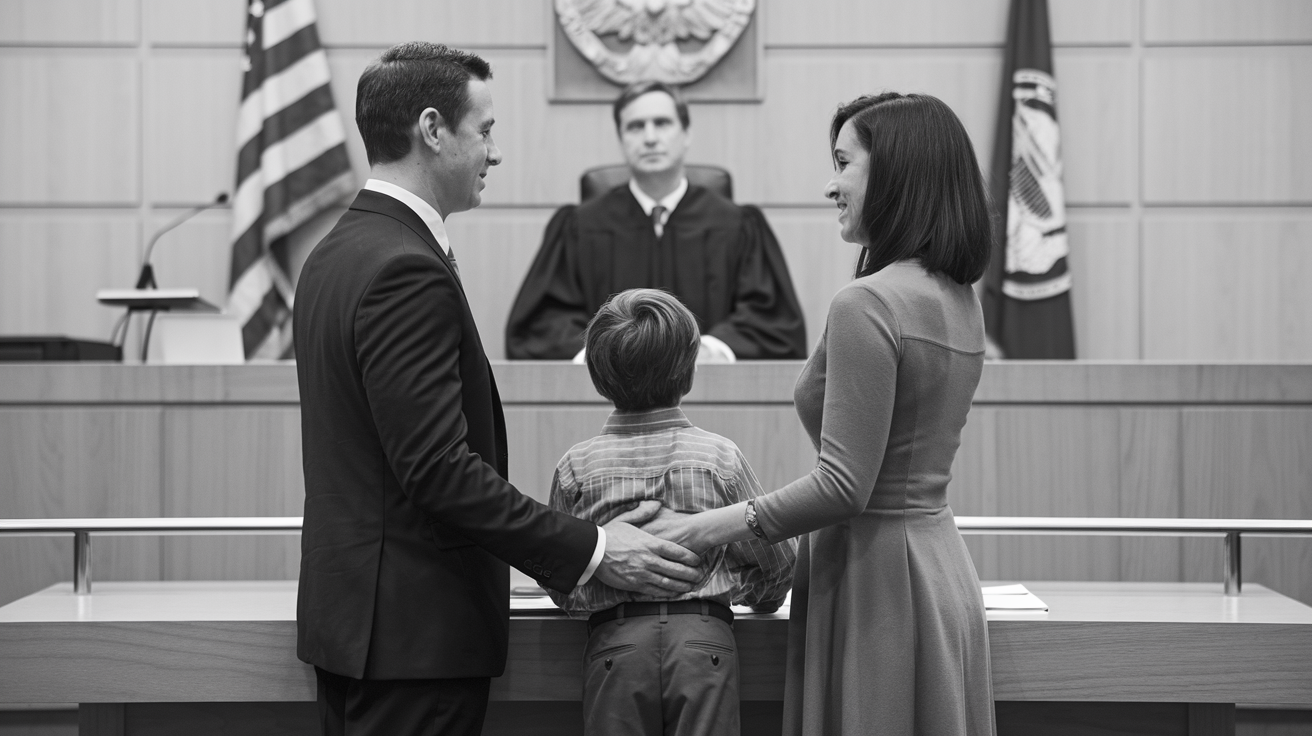Are you facing the difficult decision to end your marriage in Florida while caring for children?
Many parents feel a lot when considering this step. The legal process can seem complex, and concerns about your children’s well-being add to the stress.
However, understanding the basics of Florida’s divorce procedures helps make the process less troublesome. Filing for divorce with children requires specific steps and documentation in Florida.
Parents must know about custody arrangements, support payments, and court requirements before starting the process.
This blog breaks down each step of filing for divorce when you have children in Florida.
You’ll learn what papers to submit, which forms to complete, and how to handle important decisions about your children’s future.
Understanding Florida’s Divorce Laws

Florida divorce laws work like a set of rules that protect everyone involved. The first thing to know is that Florida follows what’s called a “no-fault” system.
This means you don’t need to prove anyone did anything wrong. Simply stating that your marriage isn’t working anymore is enough.
Here are the Basic Requirements to File for Divorce in Florida:
- Either you or your spouse must have lived in Florida for at least 6 months
- You must file your case in the county where you live
- You need to show your marriage can’t be fixed
- You must complete a parenting class if you have children
When kids are involved in divorce, Florida courts focus on what’s best for them.
Steps for Filing Divorce With Children in Florida

Filing for divorce in Florida involves several key steps to dissolve a marriage legally.
From submitting the initial petition to finalizing the divorce, the process ensures that all necessary legal requirements are met, particularly in cases involving children or property division.
Step 1: Gather Required Documents
Before starting the process, collect essential paperwork:
- Marriage certificate
- Birth certificates of all children
- Tax returns from the past three years
- Bank statements and financial records
- Pay stubs or income proof
- List of assets and debts
- Social security numbers for all family members
Step 2: Complete Required Forms
Florida Courts Need Specific Forms for Divorce Cases with Children:
- Petition for Dissolution of Marriage with Children
- Financial affidavit detailing income and expenses
- Uniform Child Custody Jurisdiction Enforcement Act affidavit
- Child support guidelines worksheet
- Notice of Social Security Number
- Parenting plan
Step 3: File the Paperwork
Take the completed forms to your local county courthouse. The clerk will:
- Review all documents for completeness
- Collect filing fees (approximately $400, though fee waivers exist for eligible persons)
- Assign a case number
- Stamp and process your paperwork
Step 4: Serve Your Spouse
Your spouse must receive official notice of the divorce filing. This happens through:
- A certified process server
- The local sheriff’s office
- Certified mail with return receipt
- Formal acceptance of service if your spouse agrees
Step 5: Complete Mandatory Parent Education
Both parents must finish a four-hour course about children and divorce. The class covers:
- How separation affects children
- Communication skills for co-parenting
- Methods to reduce conflict
- Ways to help children adjust
Step 6: Financial Disclosure
Within 45 days of filing, both parties need to share
- Complete financial records
- Asset documentation
- Debt information
- Income verification
- Monthly expenses
Step 7: Develop a Parenting Plan
Create a detailed agreement covering:
- Time-sharing schedule
- Holiday arrangements
- School and activity participation
- Healthcare decisions
- Communication methods between parents
Step 8: Attend Mediation
Most Florida courts require mediation to resolve disputes about:
- Child custody arrangements
- Support payments
- Property division
- Shared responsibilities
Step 9: Final Hearing
The last step involves meeting with a judge who will:
- Review all agreements
- Ensure child-related matters meet legal requirements
- Sign the final judgment
- Make the divorce official
An Approximate Cost for Filing the Divorce with Kids in Florida
The cost of filing for divorce in Florida, especially when children are involved, can vary significantly based on several factors, including whether the divorce is contested or uncontested.
| Cost category | Estimated cost |
|---|---|
| Basic court fees | |
| Filing petition | $400 – $410 (varies by county) |
| Service of process | $40 – $75 per person |
| Parent education course | $30 – $50 per parent |
| Certified copies of documents | $10 – $15 per copy |
| Legal representation costs | |
| Attorney retainer | $2,000 – $5,000 |
| Hourly rates | $150 – $500 per hour |
| Document preparation | $100 – $300 per form |
| Court appearance fees | $200 – $400 per appearance |
| Mediation expenses | |
| Court-ordered mediation | $60 – $120 per session |
| Private mediation | $200 – $400 per hour |
| Parenting plan development | $150 – $300 |
| Additional required costs | |
| Child custody evaluation | $1,500 – $3,000 |
| Guardian ad litem (if needed) | $1,000 – $2,500 |
| Parenting coordinator | $100 – $250 per hour |
| Financial affidavit preparation | $100 – $200 |
| Money-saving options | |
| Self-representation | Reduces costs |
| Fee waivers | Available for low-income families |
| Payment plans | Accepted by many courts |
| Legal aid services | Free help to qualifying parents |
| Online document preparation services | $150 – $300 |
| Estimated total cost | $500 – $20,000 (depends on case complexity) |
Child Custody and Visitation Arrangements to Look After
Child custody and visitation arrangements in Florida are designed to prioritize the child’s best interests, ensuring that both parents maintain a role in their child’s life.
These arrangements are determined based on the child’s needs, parental availability, and family dynamics.
Types of Custody Arrangements
| Custody type | Description |
|---|---|
| Shared parental responsibility | Both parents make decisions together about education, healthcare, and other major aspects of their children’s lives. Florida courts prefer this option to keep both parents involved in raising their children. |
| Sole parental responsibility | One parent makes all major decisions when the court finds shared responsibility would harm the child, such as in cases involving abuse, neglect, or substance misuse. |
The Court Looks at Many Factors when Making a Time-Sharing Schedule:
- Each parent’s home location and work hours
- The children’s school and activity schedules
- Each parent’s ability to care for the children
- The children’s relationship with both parents
- The children’s ages and needs
Types of Time-Sharing Plans:
Florida offers different ways to share time with your children.
- Equal time-sharing (50/50 split between parents)
- Every other weekend plus weekday visits
- Split weeks between homes
- Summer and holiday rotations
Other Common Schedules:
- Every weekend with one parent
- Every other weekend, plus dinner visits
- Summer break alternating between parents
- Split holiday schedules
Modification Options:
- Parents can agree to change arrangements
- Court approval needed for major modifications
- Changes must serve children’s best interests
- Documentation required for schedule adjustments
- Emergency modifications are available when needed
Tips for a Smoother Divorce Process with Kids

By prioritizing the children’s well-being and maintaining a positive co-parenting relationship, the process can be smoother for everyone involved.
- Keep Communication Clear: Put everything in writing and focus on the children’s needs. Use email or approved messaging apps to track conversations between parents.
- Shield Children from Conflict: Never discuss legal matters or disagreements with children. Keep adult conversations private and maintain a peaceful tone during exchanges.
- Maintain Regular Routines: Continue normal bedtimes, homework schedules, and activities. Routines help children feel secure during changes.
- Listen to Your Children: Pay attention to their feelings without asking them to take sides. Let them express worries or fears without judgment.
- Work with a Co-Parenting Calendar: Use shared digital calendars to track schedules, appointments, and activities. This reduces confusion and helps everyone stay organized.
- Document Everything: Save receipts, keep records of expenses, and note important conversations. Good documentation prevents misunderstandings later.
- Stay Focused on Solutions: When problems arise, look for fixes instead of placing blame. Consider what serves the children best in each situation.
- Be Flexible with Schedules: Sometimes plans need adjustment. Work together to accommodate special events or unexpected changes when possible.
- Keep Extended Family Neutral: Allow children to maintain relationships with both sides of the family without pressure. Family support matters during transitions.
- Take Care of Yourself: A balanced parent handles stress better. Get enough rest, exercise, and support to stay steady for your children.
- Follow Court Orders: Meet all deadlines, attend required classes, and complete paperwork promptly. This prevents delays in the process.
- Create Consistent Rules: Work with the other parent to set similar guidelines in both homes. This helps children adjust more easily to living in two places.
Conclusion
Going through a divorce with children in Florida takes patience, but the right information makes each step more manageable.
Remember that costs vary based on your situation, but options exist to help manage expenses.
Focus on open communication and keeping your children’s needs at the center of all decisions. The courts, mandatory classes, and available resources aim to support families through this transition.
Taking one step at a time helps create positive outcomes for everyone involved.
If you need more support, contact local family law resources, which are ready to help guide you through each phase of the process.
Frequently Asked Questions
What Rights Does a Father Have to His Child in Florida?
Fathers have equal rights to mothers in Florida. These include making decisions about education, healthcare, daily life, and sharing time with their children through court-approved schedules.
What Can Be Used Against You in a Divorce in Florida?
Social media posts, texts, emails, spending records, dating during separation, negative comments about your spouse, and any actions that could harm your children’s well-being can affect your case.
Can a Mother Keep the Child Away from The Father?
No, without a court order, both parents have equal rights to their children. Keeping children from other parents can lead to legal consequences and hurt your case in court.








